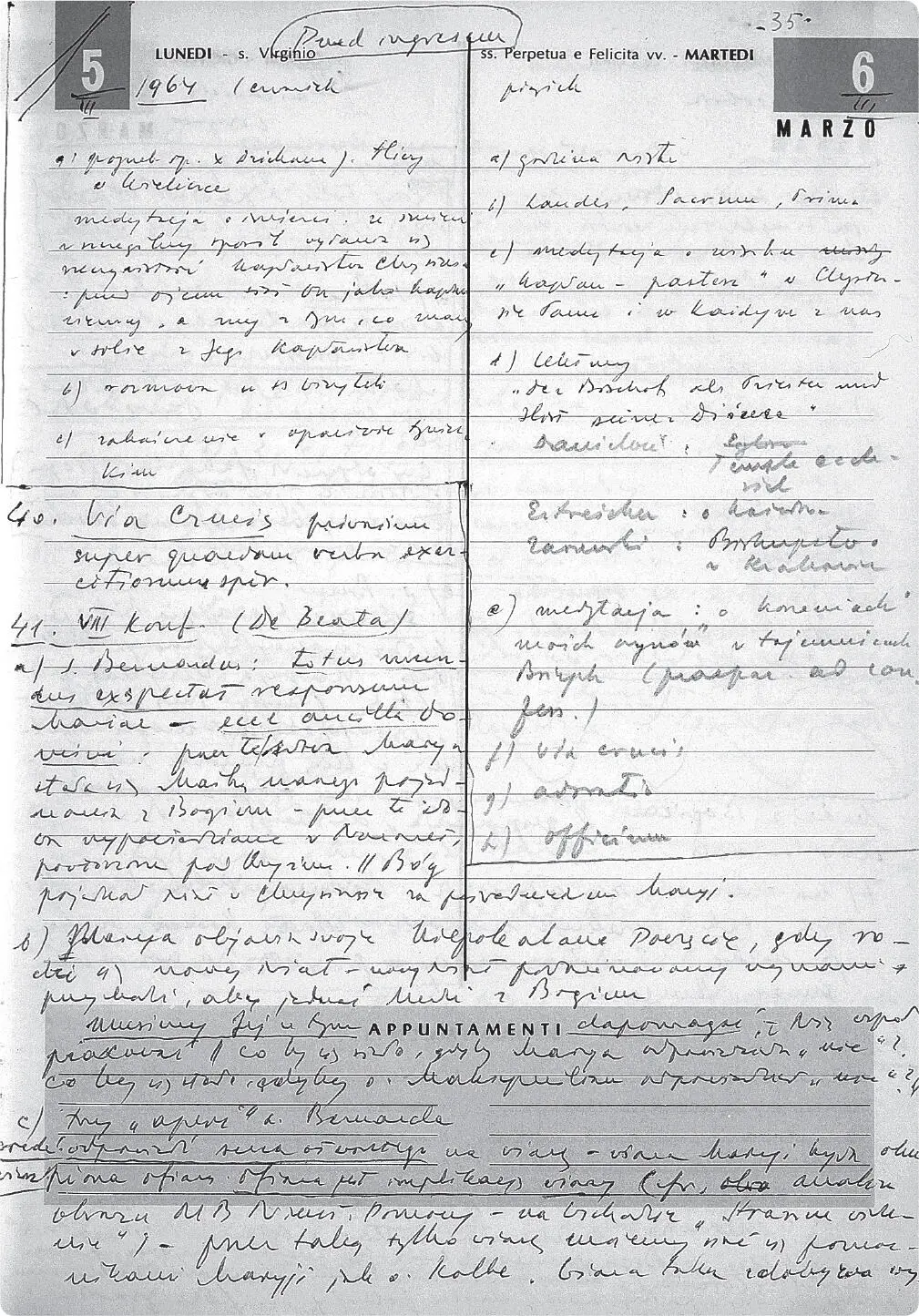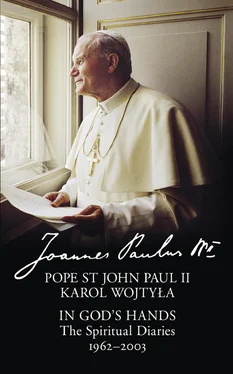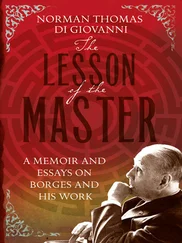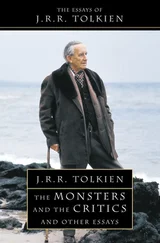[5–8] March 1964Before the installation ceremony 1

5 March
Funeral of Fr Dean J. Śliwa RIP in Wieliczka 2
Meditation on death: The reality of Christ’s priesthood emerges out of death in a special way: He stands before the Father as the eternal priest, and we stand before the Father with what we share in Christ’s priesthood.
Conversation at the Visitation Sisters’
Conclusion at the Abbey in Tyniec 3
6 March
Holy Hour; Lauds; Holy Mass; Prime
Meditation: On the relation ‘priest–shepherd’ in Christ the Lord and in each of us.
Reading: ‘Der Bischof als Priester und Hirt seiner Diözese’ [The Bishop as the Priest and Shepherd of His Diocese]; 4Daniélou: Temple [illegible]; 5Estreicher: [illegible]; [Zarewicz]: Biskupstwo Krakowskie [The Bishopric of Kraków]. 6
Meditation: On the ways in which my actions are ‘rooted’ in God’s mysteries (preparation for confession).
The Way of the Cross; Adoration; Office
7 March
Holy Mass
Meditation: ‘ Domine Deus, in simplicitate cordis mei laetus obtuli universa; et populum tuum, qui repertus est, vidi cum ingenti gaudio: Deus Israel, custodi hanc voluntatem ’ [‘Lord God … in the uprightness of my heart I have freely offered all these things, and now I have seen your people, who are present here, offering freely and joyously to you. O Lord, the God of … Israel, keep forever such purposes’]. 7
The Way of the Cross; Meditation: Priest and shepherd; Confession; Vespers
Pilgrimage to the tomb of Bl. Wincenty Kadłubek, Bishop of Kraków

8 March
Installation
31 August – 3 September 1964Retreat led by Bishop K[azimierz] J[ózef] Kowalski 1

31 August
Talk: The retreat moves on to focus on the most sacred humanity of Christ ( ergo: Mater Eius [that is: His Mother]) = sileant doctores … unus est magister: Christ … recedant creaturae … Tu mihi loquere solus [let the scholars be silent … there is one teacher: Christ … let the creatures depart … Let only You speak to me]. Indeed, I wish for and fervently beg for answers on various matters. Finally: for a ‘ kenosis ’, that is, for the destruction of self-love as a condition for listening to (in a way, a participatory dialogue in) this retreat.
1 September
Matins; Lauds; Prime
Participation in Holy Mass: with a meditation on the topic of ‘ humilis Tuae Crucis Sequela ’ [‘humble imitation of Your Cross’] (Bl. Bronisława). 2
Talk: Mission and adoration, or rather the mission to adore God. The foundation for this adoration [is] in the order of creation (creation ex nihilo [out of nothing] and creation ad Deum [towards God]): ‘You are she who is not’; 3and furthermore: the foundation in the order of grace, which is entirely and exclusively ex benevolentia et misericordia Divina [out of God’s benevolence and mercy]. Therefore, man, and even more so the priest/bishop, is ‘ doulos ’, God’s slave.
An analysis of the attitude to atheism: Cardinal Mercier’s suggestive statement on Kant: ‘ le plus grand malfaiteur du monde contemporain ’ [‘the greatest malefactor of the contemporary world’] (since he maintains that the phenomena and noumena do not tell us anything about God). The attitude grounded in Pope Paul VI’s encyclical Ecclesiam suam 4 (a dialogue with atheism) = atheism and its alternations: statolatry, materialism and the worship of one’s self (idols).
Talk: The retreat leader called the moment when Plato formulated the term ‘ participatio ’ (participation) one of the happiest moments of the human mind. With the help of this term, human thought, inspired by the revelation, could reach the reality of God and the mystery of God. For God is the One who gives Himself (the antithesis of the ‘clenched fist’). The retreat leader speaks beautifully about all the material creatures’ participation in being, and how their wealth becomes more and more visible to man – next, the living creatures’ participation in being: vegetation, sensual–affective life, spiritual life – stages, or rather incomparable domains. Even higher there is the supernatural life: grace.
Now we will move on to the participation that we, priests, have in what is most personal to Christ: in His priesthood. And in an even more complete way in episcopacy: we offer all natural and supernatural concerns of all the members of our dioceses. The retreat leader speaks in an especially beautiful way of how episcopacy should bring about the union of fatherhood and motherhood: the participation of the Divine Heart of Jesus and the Heart of Mary. It finds expression in the care for those who are in the greatest spiritual and corporal need.
Spiritual reading: (the encyclical Ecclesiam suam )

Talk: The bishop participates in Christ’s authority. What is at stake is how to use this authority. There is a way of using authority that the Master describes as appropriate for the ‘kings of this world’: they rule in such a way that their subjects can feel their authority and, what is more, they have to consider such rulers their benefactors. 5‘But not so with you’ says Christ. 6The proper mode of wielding authority in the Church must be pastoral, which was emphasised so much by John XXIII. ‘ Caritatem facientes in veritate ’ [‘Enacting love in truth’]. 7There must be a close relation between truth and love, just like between the Persons of the Most Holy Trinity veritas praecedit [the truth comes first].
On the topic of the importance of truth in the life and work of the bishop: the truth of the spoken word, the truth of judgements made about others: audiatur et altera pars [let the other side be heard as well]. The issue of advisors.
V. interesting sentence: atheism gives birth to satellites. God’s love seeks brotherhood.
On the topic of charity: it has to be universal, it cannot be particular and it cannot create divisions. Next: it has to be servile; servitude perhaps best expresses love. Finally: it has to be forgiving. All this needs to be learnt beside the Heart of Jesus through the Heart of Mary.
Anticipated Matins (memorial of St Stephen); Adoration; (Evening) Mass, 7.00 p.m.; Litany of the Saints; Benediction; Compline
2 September
Rosary; Meditation; Morning Mass, 7.30 a.m.; Lauds; Prime
Talk: On sanctity and love, based on the calling and life of St John the Evangelist. The exegesis of some passages in his Gospel, in particular the reassurance given by the Redeemer (love opens itself up, and this opening inspires others). It is this fire, this apostolic zeal, that it is mostly about. Have I inspired anybody?
Much on the attitude to the Eucharist: to protect it with utmost care (it was also mentioned in yesterday’s Benediction), but also to make it accessible as widely as possible.
Love is kindled by the Heart of the Lord Jesus and enters it together with others. The sanctity of an open heart.
Читать дальше















